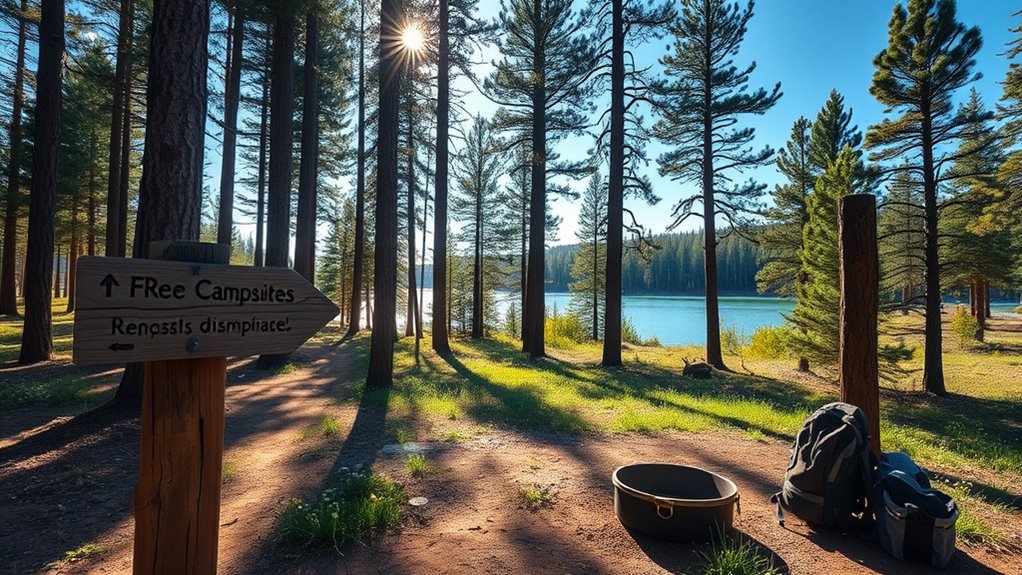To find free campsites legally, start by researching public lands like national forests, BLM areas, and state parks through official websites and apps like Gaia GPS or AllTrails. Look for dispersed camping opportunities and pay attention to signs, permits, and restrictions. Connect with local outdoor communities for tips, and always respect private property boundaries. Following Leave No Trace principles guarantees you leave areas just as you found them. Keep exploring to discover more ways to camp legally and responsibly.
Key Takeaways
- Research public land designations and check official websites for permitted camping areas and regulations.
- Use navigation apps and online resources to identify legal dispersed camping spots and verify current conditions.
- Obtain necessary permits in advance and adhere to site-specific restrictions and seasonal rules.
- Respect property boundaries by avoiding private land and seeking permission when necessary.
- Follow Leave No Trace principles by staying on designated areas, packing out trash, and minimizing environmental impact.
Research Public Lands and National Forests
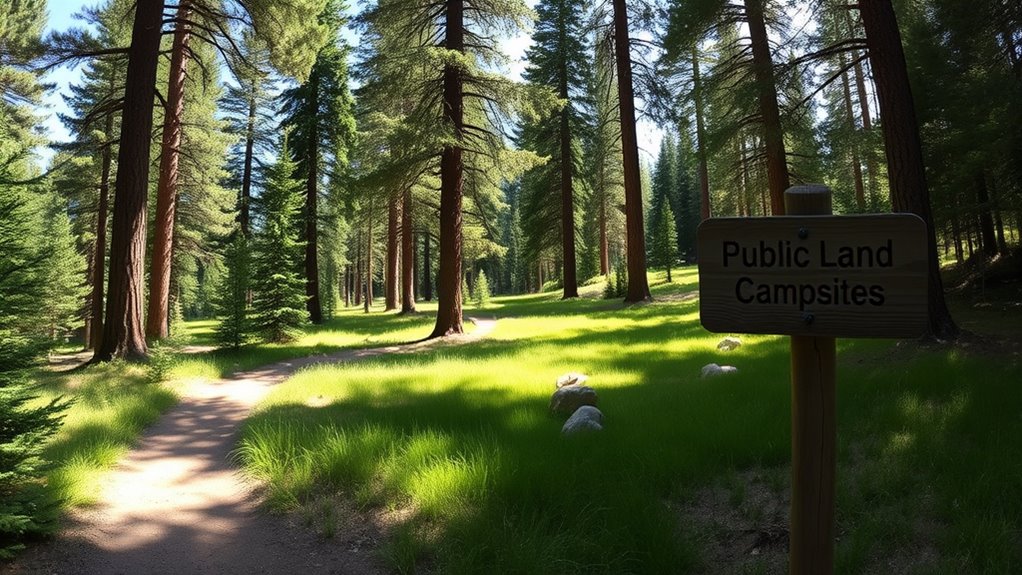
To find free campsites, start by researching public lands and national forests in your area. These lands often provide designated camping areas that are free or very low cost. Visit the official websites of your state’s Department of Natural Resources or Forest Service to locate maps, rules, and camping regulations. National forests typically allow dispersed camping, meaning you can camp outside designated sites, usually at no charge, as long as you follow Leave No Trace principles. Look for signs or markers indicating allowed camping zones. Be aware of restrictions such as fire bans, permit requirements, or seasonal closures. Doing thorough research beforehand helps you identify legal, safe spots to camp without fees, ensuring an enjoyable and trouble-free outdoor experience. Incorporating digital literacy skills can also help you access real-time updates on campsite availability and restrictions. Additionally, understanding regulations and permits for different lands can prevent inadvertent violations and enhance your outdoor experience. Staying informed about camping rules ensures compliance and helps protect natural resources for future visitors.
Utilize Online Resources and Apps
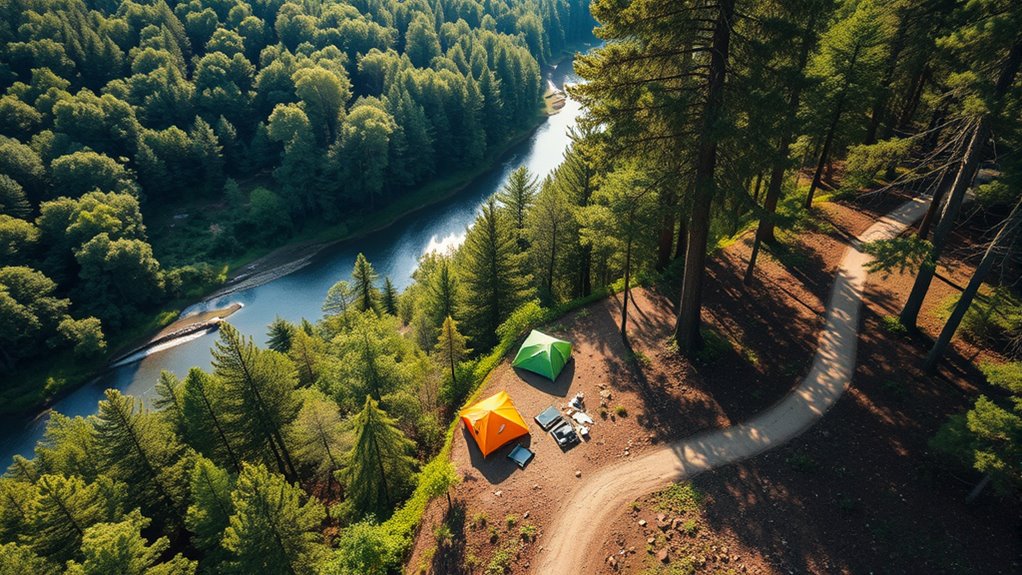
Online resources and apps can help you find free campsites quickly and reliably. Use specialized search platforms and navigation apps to pinpoint locations and get directions. Don’t forget to check government and NGO websites for the latest updates and campsite details. Leveraging mapping technology can further improve your search accuracy and streamline your planning process. Exploring official government websites can provide authoritative information about legal camping areas and regulations. Additionally, understanding local regulations and restrictions can prevent potential legal issues during your camping adventures. Being aware of nutritional advantages of green juice can also inspire healthy hydration options while on your trip.
Search Platforms for Campsites
Are you wondering where to find free campsites quickly and easily? Online search platforms are your best tools. Websites like FreeCampsites.net and Campendium offer maps and user reviews, helping you locate legal, free spots nearby. Apps such as iOverlander and AllStays provide filters to narrow down free options, including boondocking sites and public lands. These resources often include details about amenities, restrictions, and recent user experiences, so you can plan confidently. Utilizing reliable online resources ensures you access up-to-date information on site rules and availability. Additionally, checking land management agency websites can provide official listings of free camping areas and any permit requirements. This helps you stay compliant with local regulations and avoid potential issues. Exploring official government websites can further help identify protected areas where camping is permitted without fees. Social media groups and forums are also useful for insider tips and updates on free camping opportunities. By leveraging these platforms, you save time and guarantee you’re choosing legal, safe sites. Always verify current rules and availability before heading out, and use these tools as your first step in your camping journey.
Use Navigation Apps Effectively
Using navigation apps effectively can make your search for free campsites much smoother. Start by choosing reliable apps like Gaia GPS, AllTrails, or Maps.me that offer detailed maps and offline capabilities. Before heading out, mark potential spots based on user reviews, photos, and descriptions. Use filters to narrow down options, such as “dispersed camping” or “public land.” Pay attention to terrain, access roads, and nearby landmarks to avoid getting lost. Regularly update your app to get the latest information. Turn on GPS before arriving, and don’t rely solely on voice directions—visualize your route. Keep an eye out for changes in land use or restrictions that might affect your stay. Be aware that dispersed camping often requires understanding land regulations and respecting private property boundaries for legal stays. With effective app use, you’ll find suitable, legal, and safe free campsites with less hassle.
Access Government and NGO Sites
Ever wondered where to find official sites offering free camping? Government and NGO websites are your best resource. Agencies like the Bureau of Land Management (BLM), Forest Service, and state park departments provide detailed maps and lists of legal free camping areas. Many of these sites also include guidelines, restrictions, and contact info. Nonprofits like the National Parks Service or local conservation groups often offer resources about dispersed camping and special permits. Using these sites guarantees you’re camping legally and safely. Bookmark these pages or subscribe to their updates for the latest info. Apps and online databases linked to these organizations make it easy to plan your trip and avoid private property or restricted areas. Always double-check current rules before setting out. Utilizing electric bikes for exploring these areas can make your trip more eco-friendly and efficient. Additionally, exploring public lands ensures access to a variety of free camping options while supporting conservation efforts. Being aware of land management policies can help you stay compliant and respect protected areas during your camping adventures. Knowing about permitted camping zones can further improve your experience and ensure you stay within legal boundaries.
Understand Local and State Regulations
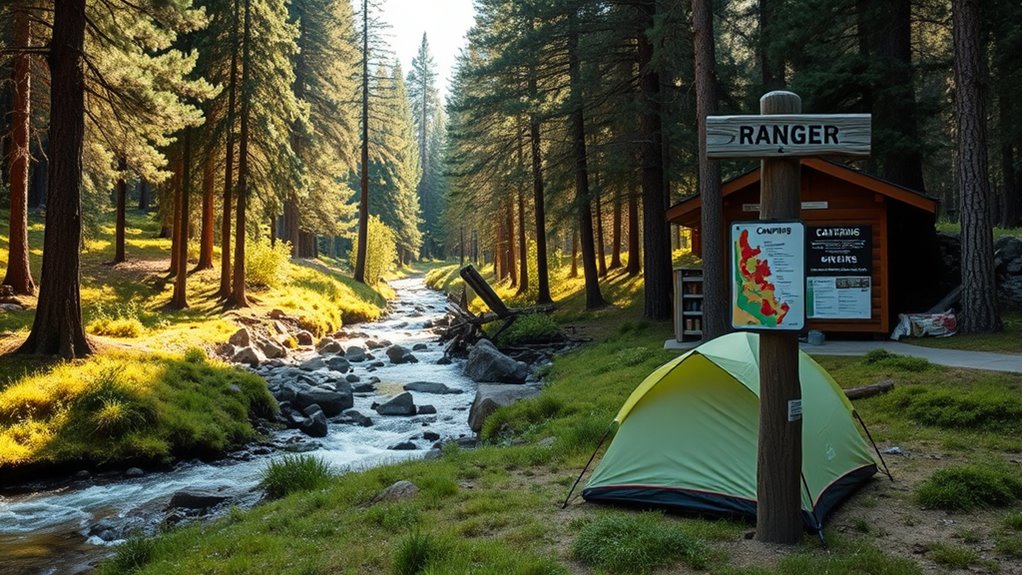
Before setting up camp, you need to understand the local and state regulations that apply. Make sure to check permit requirements and be aware of any restrictions in the area. Respecting these rules helps keep your camping experience smooth and legal. Additionally, being aware of zoning laws and land use regulations can help you avoid potential legal issues during your trip. Incorporating home organization principles, such as understanding property boundaries and land rights, can further ensure compliance with local guidelines. Being familiar with affiliate disclosures and privacy policies of online resources can also support your research process.
Research Permit Requirements
Understanding local and state permit requirements is essential before setting up camp, as regulations vary widely between regions. Before you arrive, research the specific rules governing the area. Check official websites or contact local agencies to find out if permits are needed for camping, fires, or vehicle access. Some public lands require free or paid permits, especially in popular or protected areas. Failing to obtain necessary permits can lead to fines or eviction. Keep track of permit validity dates and any restrictions on camp locations. If permits are required, apply in advance to avoid delays. Being informed ensures your camping experience remains legal and stress-free. Taking the time to understand permit requirements saves you from potential legal issues and helps preserve the natural environment. Proper vase selection and understanding regulations contribute significantly to an enjoyable and compliant outdoor experience. Additionally, understanding permitting regulations helps you plan your trip more effectively and avoid unexpected complications. Being aware of Gold IRA regulations can also be beneficial if you are considering diversifying your investments to include precious metals as part of your financial planning. Consulting local law enforcement agencies can provide additional guidance and clarification on applicable rules and restrictions.
Know Park Restrictions
Knowing the specific rules and restrictions of a park helps guarantee your camping trip stays within legal boundaries. Before heading out, review the park’s regulations, including stay limits, designated camping areas, and fire restrictions. Some parks prohibit camping in certain zones or require permits for overnight stays. Check if there are specific rules about waste disposal, quiet hours, or the use of generators. Being aware of these rules helps you avoid fines or eviction. Also, verify if there are seasonal restrictions or special regulations related to wildlife protection. By understanding these guidelines, you ensure your camping experience is safe, respectful, and legal. Taking the time to familiarize yourself with park restrictions shows respect for the environment and helps preserve the area for future visitors. Additionally, understanding local regulations can prevent unintentional violations that could jeopardize your access or lead to penalties. Recognizing regulatory frameworks in the area can also help you stay compliant with evolving laws and guidelines. Being aware of enforcement policies can further inform you about potential consequences for violations. Consulting official park sources can provide the most accurate and up-to-date information about restrictions and laws.
Respect Local Laws
Being aware of local and state laws is essential to guarantee your camping trip remains legal and trouble-free. Before setting up camp, research the rules in the area. Some locations prohibit overnight stays on public land or restrict camping to designated sites only. Check for any permits, fire restrictions, or specific regulations about waste disposal. Respect signage and posted regulations, as ignoring them can lead to fines or eviction. Remember that laws vary from place to place, so what’s permitted in one area might be illegal nearby. By understanding and following these rules, you help protect the environment and ensure access for future campers. Staying informed shows respect for local communities and helps you avoid unnecessary complications during your trip. Additionally, understanding the importance of permitted outdoor activities can help you plan within legal boundaries and enjoy your trip responsibly. Recognizing local wildlife protections can also prevent disturbances and promote conservation efforts during your camping experience. Being familiar with floating on water regulations is also crucial when engaging in water-based activities to avoid violations and ensure safety.
Look for Dispersed Camping Opportunities
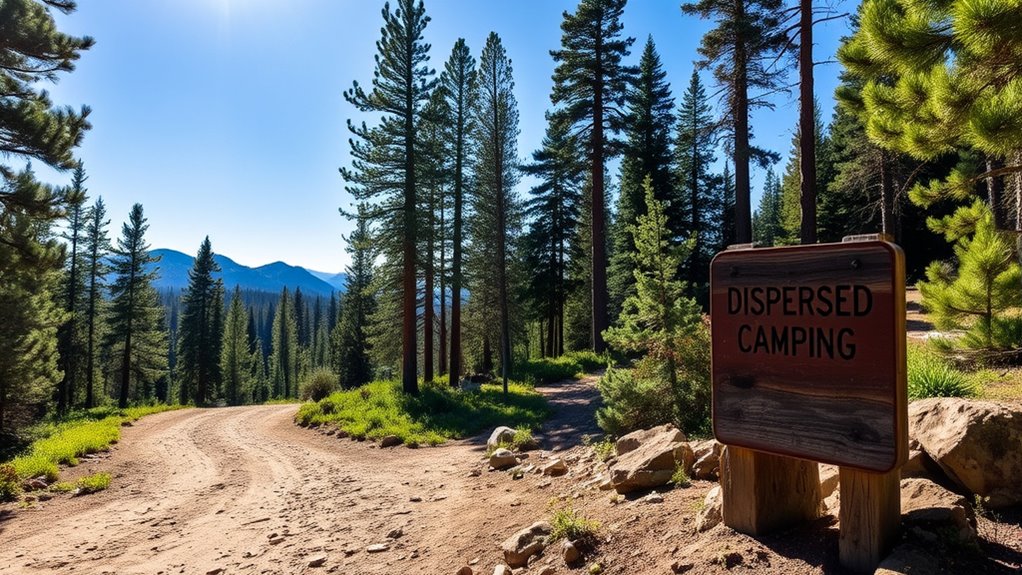
Dispersed camping offers a great way to enjoy the outdoors without the crowds or fees associated with developed campgrounds. It typically means camping outside of designated campgrounds, often on public lands like national forests or Bureau of Land Management (BLM) areas. To find these spots, start by researching public land agencies’ websites, which often include maps and regulations. Look for areas labeled as suitable for dispersed camping; these usually don’t require reservations or fees. Keep an eye out for signs and access roads that lead to these sites. Remember to follow Leave No Trace principles—pack out all trash, stay on established roads or routes, and respect the environment. Dispersed camping is a fantastic way to connect with nature freely and quietly.
Connect With Local Camping Communities
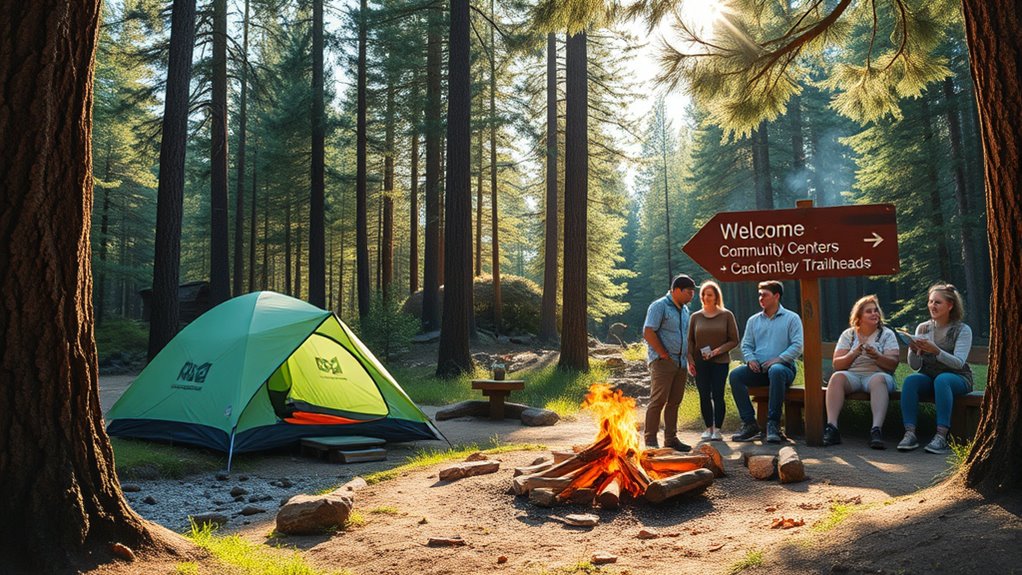
Connecting with local camping communities can greatly enhance your outdoor experience by providing valuable advice, shared resources, and camaraderie. By engaging with enthusiasts nearby, you gain insights into hidden spots, regulations, and best practices. You might also find opportunities to swap gear or join group outings, saving money and building connections.
Connecting with local camping groups enriches your adventure through shared tips, resources, and community bonds.
To get started, consider:
- Joining online forums or social media groups dedicated to local camping
- Attending outdoor meetups or events in your area
- Asking at local outdoor stores for recommendations and tips
These interactions can lead to trusted advice and even invitations to private or lesser-known sites. Building relationships within the community helps you discover new, legal free camping spots while fostering a sense of belonging.
Identify BLM Land for Free Camping
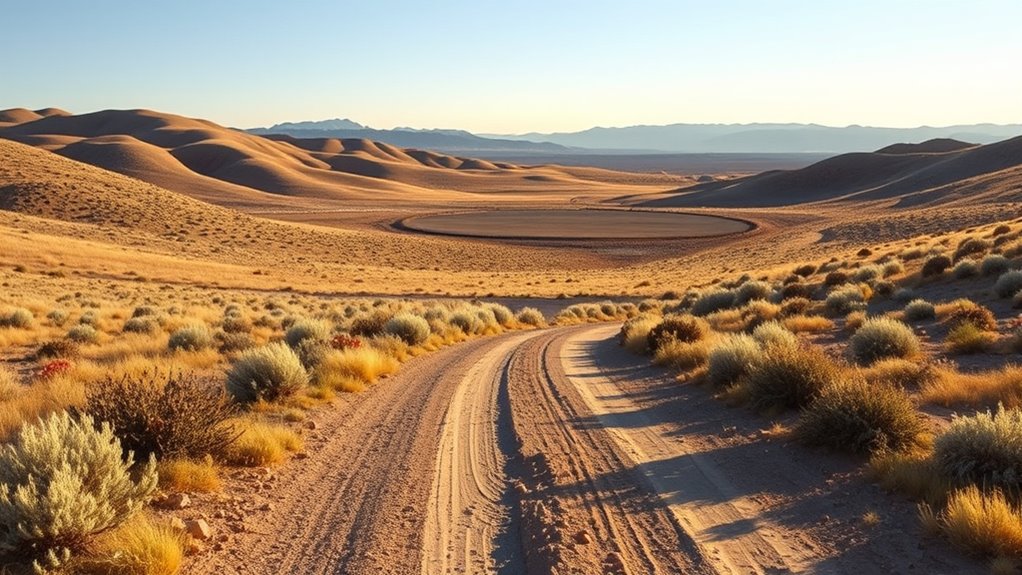
You can find free camping spots on BLM land across many regions, but it’s important to know where they are. Make sure to check local permits and regulations before setting up your site, so you stay within the rules. Always respect the land and follow guidelines to keep these spots open for everyone.
BLM Land Locations
Looking for free camping spots? BLM land offers many options across the country, making it easier to find a spot without paying. To locate BLM land for camping, start by visiting the BLM’s official website or using online maps. You can also download apps that show public land boundaries and available sites.
Here are some tips to find the right spot:
- Check BLM land maps for designated camping areas
- Use online forums and resources for recent reports
- Contact local BLM offices for advice and current regulations
Keep in mind, BLM land is typically open to dispersed camping, but rules vary by location. Always double-check specific land rules before setting up camp.
2. Permits and Regulations
While BLM land offers great opportunities for free camping, it’s important to understand the permits and regulations that govern these areas. Many BLM sites are open for dispersed camping without a permit, but some locations require a permit or have specific rules you must follow. Always check the local BLM office or website before setting up camp to see if permits are needed. Pay attention to stay limits, fire restrictions, and camping duration rules, which vary by area. Violating regulations can lead to fines or eviction. Make sure you’re aware of any designated camping zones and avoid restricted areas. Staying informed helps you camp legally, safely, and responsibly on public land.
3. Respecting Land and Rules
Identifying BLM land suitable for free camping requires paying close attention to land designations and restrictions. Always verify that your chosen area allows camping and follow posted signs and guidelines. Respect the environment by staying on designated roads and avoiding damage to vegetation. Pack out all trash, leave no trace, and minimize your impact. Be considerate of other campers and local residents, keeping noise levels down and respecting private property boundaries. Remember, rules are in place to preserve these areas for everyone’s enjoyment.
To stay compliant, keep in mind:
- Check for designated camping zones and restricted areas
- Follow fire regulations and use established fire rings
- Avoid disturbing wildlife and fragile habitats
Respect Private Property Boundaries
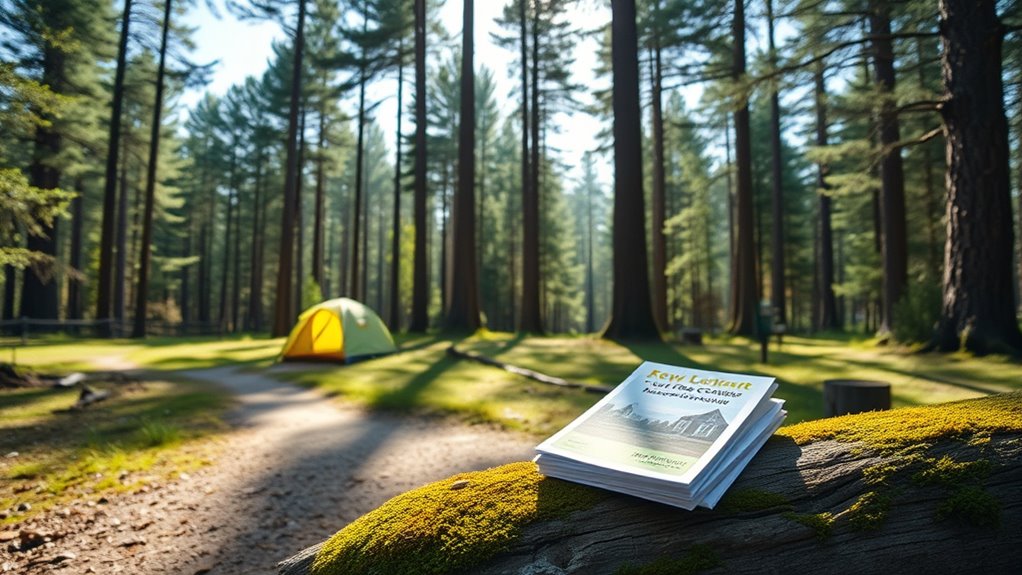
Why is respecting private property boundaries essential when searching for free campsites? Because crossing onto someone’s land without permission can lead to legal trouble, fines, or being asked to leave immediately. It shows respect for landowners and helps maintain good relationships with those who own nearby properties. Many landowners are willing to allow camping if you ask for permission beforehand, but sneaking onto private land damages trust and could result in conflicts. Always look for designated areas, signs, or fences that mark property boundaries. If you’re unsure, ask local residents or landowners politely. Respecting boundaries ensures you stay within the law and preserves your ability to find free campsites in the future. Being considerate keeps the outdoor community welcoming and sustainable for everyone.
Follow Leave No Trace Principles
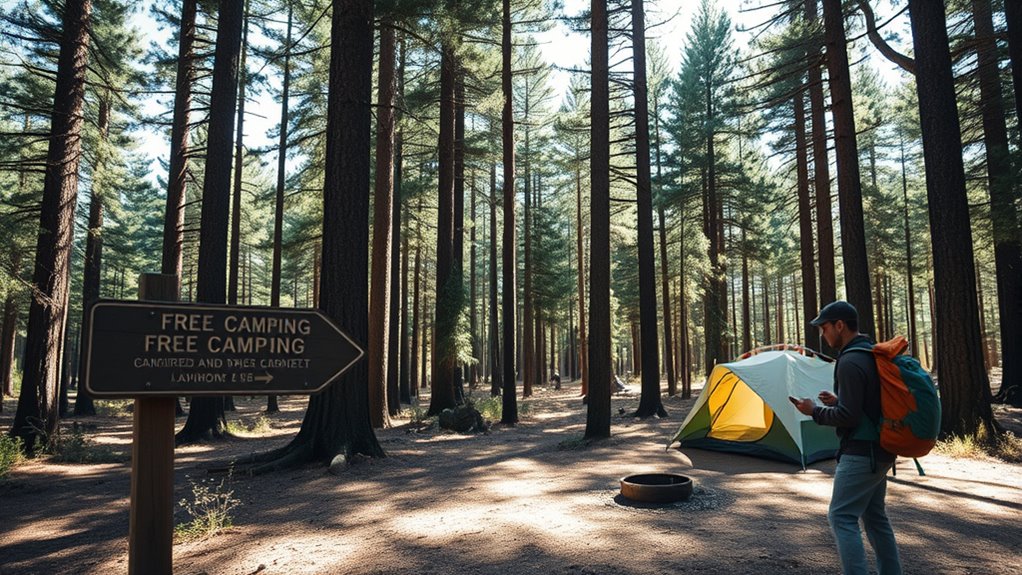
Respecting private property boundaries helps you avoid conflicts and legal issues, but maintaining responsible camping habits goes further in protecting the environment. Following Leave No Trace principles ensures you minimize your impact and preserve the beauty of natural areas. Always pack out what you bring in, including trash and food scraps. Stick to established trails and campsites to prevent erosion and habitat damage. Be mindful of fire regulations, and keep campfires small or avoid them altogether when necessary. By practicing these habits, you help sustain the environment for future visitors and maintain access to free camping spots.
- Pack out all trash and waste
- Use existing fire rings or portable stoves
- Avoid disturbing wildlife or plants
Plan Ahead for Permits and Restrictions
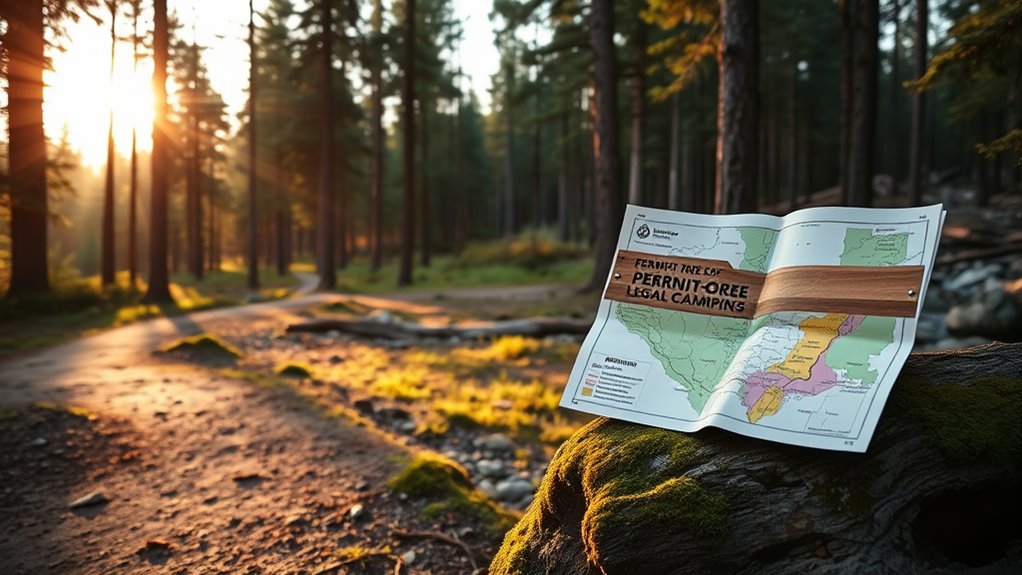
Planning ahead for permits and restrictions is essential to guarantee your camping trip goes smoothly. Many public lands require permits, especially during peak seasons, and some areas have restrictions on campfire use, vehicle access, or camping duration. To avoid surprises, check the rules of your chosen site beforehand.
| Permit Needed | Restrictions |
|---|---|
| Yes for some sites | No campfires during dry seasons |
| Usually free | Limited stay duration |
| Obtain in advance | Vehicle access may be limited |
Stay Safe and Be Prepared
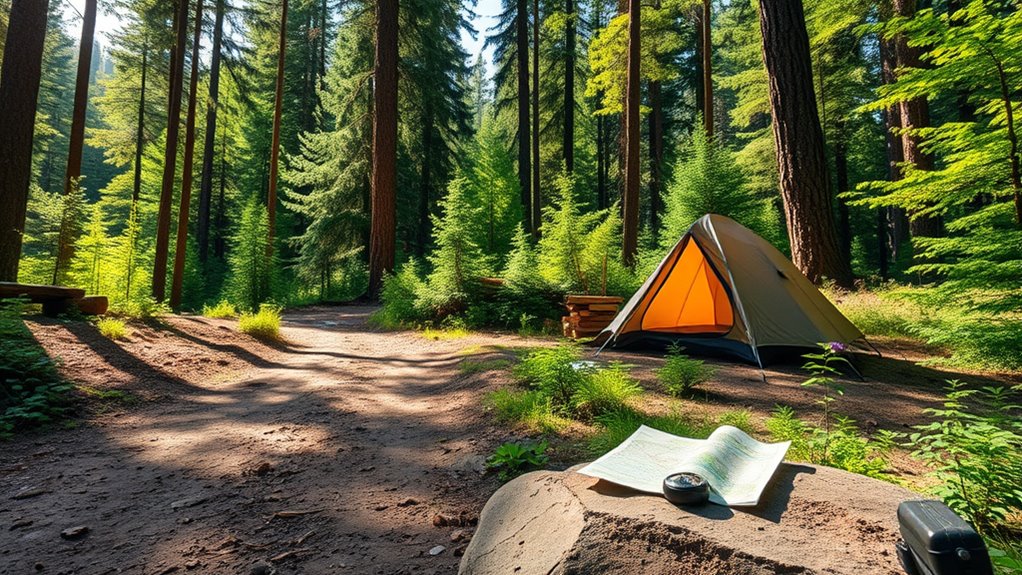
Once you’ve secured your permits and understood any site restrictions, it’s time to focus on staying safe and being prepared. Always carry a well-stocked first aid kit, and know basic first aid skills. Keep a map and compass or GPS device handy to avoid getting lost. Stay aware of weather conditions and plan accordingly to avoid emergencies.
Here are key safety tips:
- Pack sufficient water, food, and emergency supplies
- Inform someone about your plans and expected return
- Stay on designated trails and campsites to prevent accidents
Remaining alert and prepared helps you enjoy your trip while minimizing risks. Trust your judgment, respect the environment, and always prioritize your safety to ensure a positive camping experience.
Frequently Asked Questions
Are There Any Fees Associated With Dispersed Camping on Public Lands?
You might wonder if there are fees for dispersed camping on public lands. Generally, dispersed camping is free, but some areas require a permit or have specific rules. Always check with the land management agency beforehand. While you avoid campground fees, be prepared for potential costs like permits or fire restrictions. Staying informed helps you enjoy your trip legally and responsibly without unexpected charges.
How Can I Verify if a Campsite Is Legally Designated as Free?
You’re about to unlock the secret to stress-free camping! To verify if a campsite is legally designated as free, start by checking official government websites like BLM, Forest Service, or state parks. Look for designated dispersed camping areas and read posted signs carefully. Call local land management offices if you’re unsure. This simple step guarantees you camp legally—saving you from hefty fines and keeping our public lands pristine for everyone.
What Are Common Violations That Could Lead to Fines or Penalties?
You should be aware that common violations like camping in restricted areas, overstaying the allowed time, or not having proper permits can lead to fines or penalties. Ignoring posted signs, trespassing on private property, or parking in no-camping zones also increases your risk. Always follow local rules, respect designated areas, and stay within the limits to prevent legal trouble and ensure a safe, enjoyable camping experience.
Can I Camp for Free on Private Land With Permission?
Did you know that over 60% of private landowners are willing to allow camping if you ask? You can camp for free on private land, but only if you get explicit permission from the owner. Always respect their rules and boundaries, and make sure you leave no trace. This approach not only keeps you legal but also helps build positive relationships with landowners, making future stays more possible.
How Do Seasonal Changes Affect Free Camping Opportunities?
Seasonal changes considerably impact your free camping options. In summer, you’ll find more spots available, especially in cooler, higher elevations, but some areas may be crowded or restricted due to fire bans. During winter, access can become limited with snow or cold weather, but you might discover secluded spots in milder regions. Always check local regulations and weather updates before heading out, ensuring your safety and legal compliance.
Conclusion
By exploring public lands and respecting boundaries, you become a steward of the wilderness’s soul. Embrace the freedom of dispersed camping, where nature’s quiet whispers guide you. With preparation and care, you’ll leave no trace behind, like footprints in the sand that time gently erases. Your journey is a key to revealing hidden treasures beneath the vast, open sky—an invitation to connect with the wild and preserve its beauty for generations to come.
